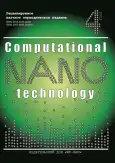Electronic Library System by Means of Object-Oriented PYTHON Programming
- Authors: Epifantseva V.A.1, Efremov S.K.1, Nesterenko I.S.1
-
Affiliations:
- Krasnodar University of the Ministry of Internal Affairs of the Russian Federation
- Issue: Vol 10, No 4 (2023)
- Pages: 84-90
- Section: INFORMATICS AND INFORMATION PROCESSING
- URL: https://journals.eco-vector.com/2313-223X/article/view/626788
- DOI: https://doi.org/10.33693/2313-223X-2023-10-4-84-90
- ID: 626788
Cite item
Abstract
The article discusses the features of the development of an electronic library system of the Department of Computer Science and Mathematics. The electronic library system allows you to access educational, scientific and professional literature in electronic form. In addition, electronic library systems usually contain not only the texts of books, but also other materials, such as articles, journals, dissertations, audio and video files, etc. This allows users to get complete information on the research topic. The developed library system is intended for cadets and students of higher educational institutions of the Ministry of Internal Affairs of Russia, employees of the Department of Internal Affairs.
Full Text
About the authors
Victoria A. Epifantseva
Krasnodar University of the Ministry of Internal Affairs of the Russian Federation
Author for correspondence.
Email: torohova_viktori@mail.ru
teacher, Department of Computer Science and Mathematics
Russian Federation, KrasnodarSergey K. Efremov
Krasnodar University of the Ministry of Internal Affairs of the Russian Federation
Email: efremovsk1955@mail.ru
Cand. Sci., Associate Professor, Department of Computer Science and Mathematics
Russian Federation, KrasnodarIvan S. Nesterenko
Krasnodar University of the Ministry of Internal Affairs of the Russian Federation
Email: nest-i@list.ru
Cand. Sci. (Pedag.), associate professor, Department of Computer Science and Mathematics
Russian Federation, KrasnodarReferences
- Artemyeva E.B., Soboleva E. Formation of a model of a system of continuous library education in the federal districts of the Russian Federation. Informational Bulletin of Russian Library Association. 2003. No. 24. Pp. 43–45. (In Rus.)
- Barilovskaya V.M. Analysis of the use and demand for electronic information resources in the libraries of universities of the Federal Drug Control Service of Russia and the Ministry of Internal Affairs of Russia. Algorithms of Higher Education. Bulletin of the Siberian Law Institute of the Federal Drug Control Service of Russia. 2013. No. 2 (13) Pp. 141–144. (In Rus.)
- Epifantseva V.A. Methods and technologies for protecting information and databases in departments of the Ministry of Internal Affairs of Russia using object-oriented programming. In: Mathematical methods and information technology means. Proceedings of the XVI All-Russian Scientific and Practical Conference. Krasnodar, 2020. Pp. 37–40.
- Kamaletdinov R.K. Automated library information systems as a means of mastering and implementing ICT: The experience of the Republic of Tatarstan. Bulletin of the Kazan State University of Culture and Arts. 2012. No. 4. Pp. 67–73. (In Rus.)
- Kachanova E.Yu. Library innovation as a theory of change: Monograph. Khabarovsk, 2002. 210 p.
- Nikulicheva N.V., Sarmaeva E.A., Khapaeva S.S. Analysis of modern automation tools for library and information activities of educational organizations. Bibliosphere. 2015. No. 4. Pp. 65–72. (In Rus.)
- Pavlov A.I. Modern technical base of a large library. Biosphere. 2014. No. 3. Pp. 58–68.
- Starostenko I.N., Epifantseva V.A. Intensification of the educational process with the help of computer simulation programs. In: Problems of information support for the activities of law enforcement agencies. Collection of articles of the IX All-Russian Scientific and Practical Conference. Belgorod, 2022. Pp. 147–153.
- Fedorova S.M. Special libraries of educational organizations of the Ministry of Internal Affairs of Russia: Problems and prospects of development. Scientific. Theory. Practice. 2016. No. 1. Pp. 45–49.
Supplementary files








